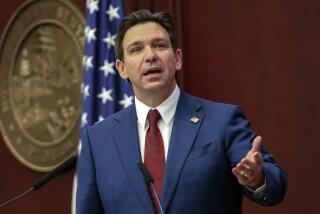Atlanta’s Same-Sex Rights Contested
- Share via
ATLANTA — There is a saying in this city’s artsy, edgy neighborhoods: We’re not in Georgia here, we’re in Atlanta. Congenial to gays and lesbians as well as Fortune 500 companies, Atlanta has thrived as a liberal enclave distinct from the conservative state that surrounds it.
But a bill submitted Tuesday in Georgia’s newly Republican-dominated Legislature would repeal a section of an Atlanta city ordinance that prohibited discrimination against same-sex couples.
“You have a true philosophical divide between the state Legislature and the city of Atlanta,” said Rep. Earl Ehrhart, the bill’s sponsor, a Powder Springs Republican and the incoming chairman of the House Rules Committee.
This challenge affects one of the city’s major interest groups. According to the 2000 census, Atlanta has 12,000 same-sex households -- the fourth-highest concentration of gay couples among America’s big cities, after San Francisco, Seattle and Oakland, said Gary Gates, co-author of “Gay & Lesbian Atlas.”
Since the 1970s, when Mayor Maynard Jackson made a groundbreaking proclamation in honor of Gay Pride Day, Atlanta’s leaders have been openly supportive of the city’s gay community, said Berl Boykin, who is working on a history of gay activism in Atlanta. Mayor Shirley Franklin, he said, has carried on that tradition.
“It is certainly one of the freest cities in the South and one of the freer ones in America,” Boykin said. When gays and lesbians grow up in the conservative South, “where are they going to come? Atlanta -- fabled, fabulous Atlanta.”
Ehrhart’s challenge arose out of a long-simmering dispute between an Atlanta country club’s board of directors and two members who first asked for domestic partnership benefits in 1999.
Psychologist Lee Kyser, 57, an avid golfer, paid a $40,000 initiation fee to join the exclusive Druid Hills Golf Club, and wanted the club to give her partner, attorney Lawrie Demorest, 51, the same benefits that spouses are given -- the right to attend alone and to bring her own guests, and the right to assume the membership should Kyser die. Randy New, 50, a gay man who also joined the club, made the same request for his partner, Russell Tippins, who is 42.
Emmet Bondurant, the club’s attorney, said the couples knew the club’s rules when they joined.
“The club’s really fundamental position is that it simply doesn’t discriminate based on sexual preference,” he said. “It knowingly admits people who are gay, and treats unmarried heterosexual and homosexual couples in precisely the same manner.”
A year later, the dispute was still unresolved when Atlanta’s City Council passed an antidiscrimination ordinance, prohibiting businesses from discriminating on the basis of sexual orientation or domestic relationship status. The couples’ complaint against the golf club came before the city’s Human Relations Commission, which found in January 2004 that the club had violated the city ordinance.
Franklin pressed the parties to negotiate -- without success. In a speech in November, she told a gay executive group that she was reluctant to act because the ordinance was vulnerable to legal challenge. On Dec. 23, Franklin requested that the city’s municipal solicitor impose a fine of $500 a day on the golf club, to a maximum of $90,000, City Attorney Linda DiSantis said. The fine has not yet been imposed, DiSantis said.
Franklin’s decision was “a wonderful Christmas present for our community,” Boykin said. “She’s a woman of moral conviction.” But her decision also set the stage for a confrontation.
Ehrhart immediately began work on a bill to give organizations the right to deny benefits to couples who were not married. It would also prohibit state or local government from penalizing any organization for doing so. Although a similar bill foundered last year, the new bill was likely to pass.
Ehrhart argues that the city ordinance violates the club’s constitutional right to select its own members -- the 1st Amendment right to “expressive association” that enabled the Boy Scouts to ban gay scout leaders, according to a 2000 Supreme Court decision.
It also comes into conflict with the state constitution, he says. In November, 76% of voters approved a state constitutional amendment against same-sex marriage that also banned civil unions and other partnership benefits.
“We have established in Atlanta a zone where special protection will exist that doesn’t exist in Georgia and really doesn’t exist in the rest of the country,” said Todd Young, communications director for the Southeast Legal Foundation, a conservative legal group.
DiSantis said she did not believe the city ordinance contradicted the amendment against same-sex marriage because “the ordinance is not based on marriage,” but on “eliminating unfairness and discrimination.”
Gay rights advocates are protesting Ehrhart’s bill as an infringement on the right to home rule.
“Here we have elected officials from very small towns that aren’t hosts to major Fortune 500 corporations and don’t have an understanding of how they do business. They’re telling the city of Atlanta what it can and can’t do,” said Chuck Bowen, executive director of Georgia Equality, the state’s largest gay rights organization.
Demorest, Kyser’s partner, said the couple had received support from many members of the golf club. It would be sad, she said, if the state Legislature overturned the city ordinance.
More to Read
Sign up for Essential California
The most important California stories and recommendations in your inbox every morning.
You may occasionally receive promotional content from the Los Angeles Times.










